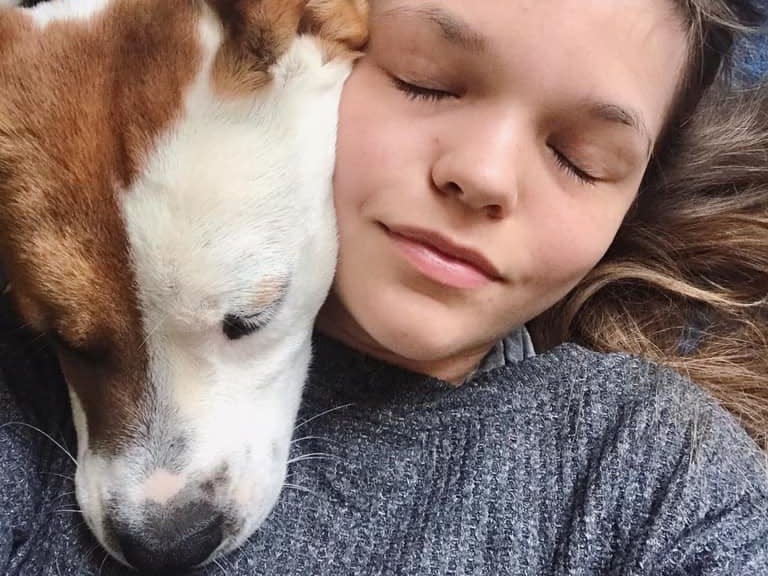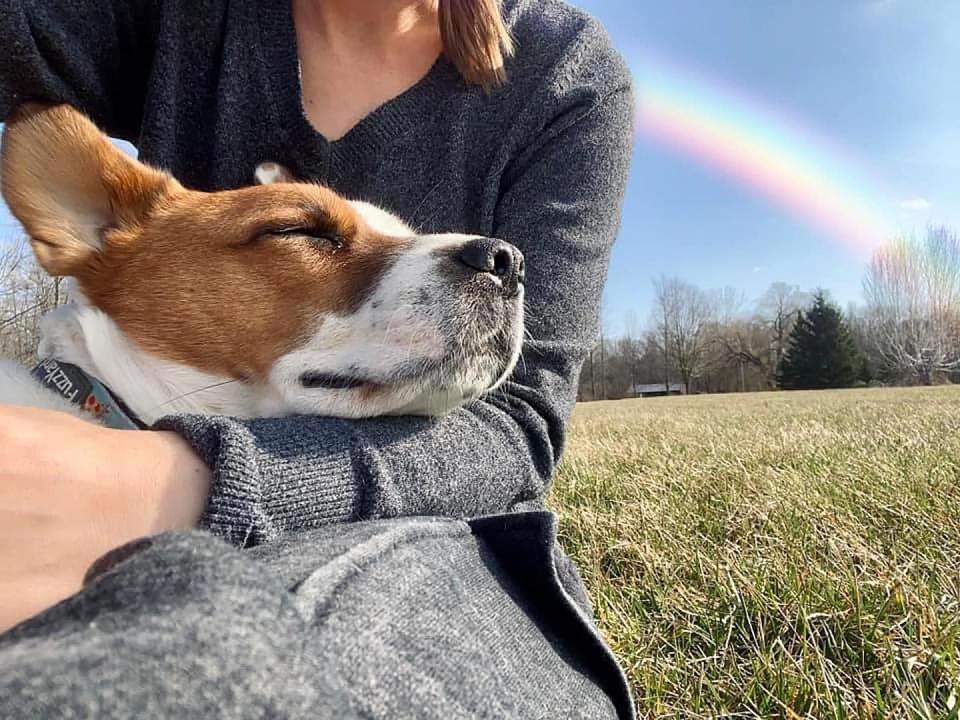Losing my dog was the hardest thing ever. But I'm grateful for the time we got together.

My dog Taco was 3 years old and my everything.
I noticed he wasn't interested in food, and shortly after he was diagnosed with Lyme nephritis.
Since losing him I've learned that his death feels like a family member's.
My morning routine was simple: wake up, get dressed, let my dog out, and pour our breakfasts. Taco, my 3-year-old terrier, loved his kibble and never missed a piece. As I sipped my coffee, I'd watch him finish his bowl, and our day would continue.
One morning, I noticed Taco's disinterest in his food. It seemed strange but not impossible. By evening, his bowl remained untouched.
"Do you want something else?" I asked, filling his bowl with different kibble. He ate a little and then left the rest. "Strange," I thought.
The next morning, when he didn't eat much, I called the vet, and by noon, we were in the waiting room. I kissed his ear. "You're OK," I said. "Later, we'll do something fun."
When the vet brought us back, she asked questions, and I answered. "His energy's great; there have been no other changes," I said. My vet agreed to run some tests, and as they left the room, I told him again, "You're OK."
I really thought he was until he wasn't, and life just wasn't. When the vet and Taco came back 30 minutes later, she said the prognosis wasn't good. I shook my head. "No. He's thriving," I told her. "We went running yesterday."
"He's not," she said again. I sat on the bench, leaning into my dog.

I said. "Please tell me you're wrong." But my vet couldn't. My dog had Lyme nephritis, and she couldn't fix it. My dog wouldn't live much longer, and there wasn't anything we could do but go home.
I had never lost a pet before, and while I knew it'd be hard, I never imagined the depth of pain and helplessness that'd consume me.
There were a lot of things I didn't know about pet loss, especially how it starts before they die.
I called another vet for a second opinion
My sister set me up with her vet, who fit us in for the following week. Meanwhile, I called other vets, one after another. As much as I trusted my vet, I wanted every opinion I could get. I read Taco's charts and labs to them, numbers I didn't understand, but maybe they would.
I was grasping for hope, willing someone, anyone, to say something different. No one could.
After contacting nearly every vet in my county and seeing another in person, I realized how much science was against us. If my dog were going to survive, it'd take a miracle.
I begged God to save him
Over the next three weeks, I sat on my apartment floor, pleading with God to spare my dog.
"I'll do anything, I'll give up anything," and "I know I'm not perfect, but I don't do bad things — please help," I said out loud.
I've always prayed a lot, but never so desperately and never in a way that made me feel like I was bargaining.
I watched his personality fade
I was losing him, and quickly, too. Not long after Taco's vet visit, I watched his excitement for life dim.
Instead of heading to the window when I pulled in, he'd stay in bed. Instead of following me outdoors, he'd stay put. Sleeping seemed more appealing than playing, and it felt like a gut punch every time.
My dog's personality was fading, and I could do nothing to stop it. There weren't enough Kongs, balls, or treats to bring him back.
The vets and science were right. And although I wanted to cling to hope, my dog was dying, and I knew I couldn't let him suffer. Physically, he was here, but his personality was gone, and the pain was now present, too.
I had to let him go
On our last day together, at 4:30 a.m., I lay on the couch and held him, his weak, soft body pressed against mine. The vet office wouldn't open for three more hours, and when they did, I knew I'd be making the call no pet owner wants to make.
During that brief window, I talked to him. "You're the best thing to ever happen to me. I love you. You are the best part of me. I love you."
I didn't want to sit in the car for 30 minutes or make that vet visit, but if taking away his pain meant giving it to me, I'd take every piece of it.
"It's OK to let go," I told him.
I started grieving him all over again
When Taco died at the vet, a piece of me died, too. He truly was the best thing to ever happen to me, and although I no longer have him, that won't change.
Knowing him made me lucky, and calling him my dog shaped who I am now. Now, I carry both luck and brokenness with me — but not evenly. I feel the luck stronger on some days and the grief more on others. Still, the love I have for Taco is present, and knowing he isn't in pain is the sliver of comfort that helps.
Every morning as I pour my coffee, I stare at his pictures, his bed, and his bowls that I refuse to move, and I feel it so deeply.
Since losing him, I realized pet loss feels like losing a family member; that's true, but it begins before then.
For me, grieving Taco didn't start when he died or when the vet said he was terminal. It started when I realized the miracle I was begging for, "please save my dog," was never coming.
Taco was my miracle, and I'm grateful for him every day.
Read the original article on Business Insider


